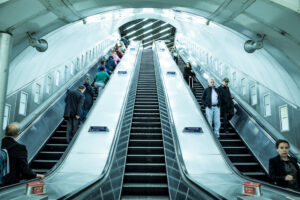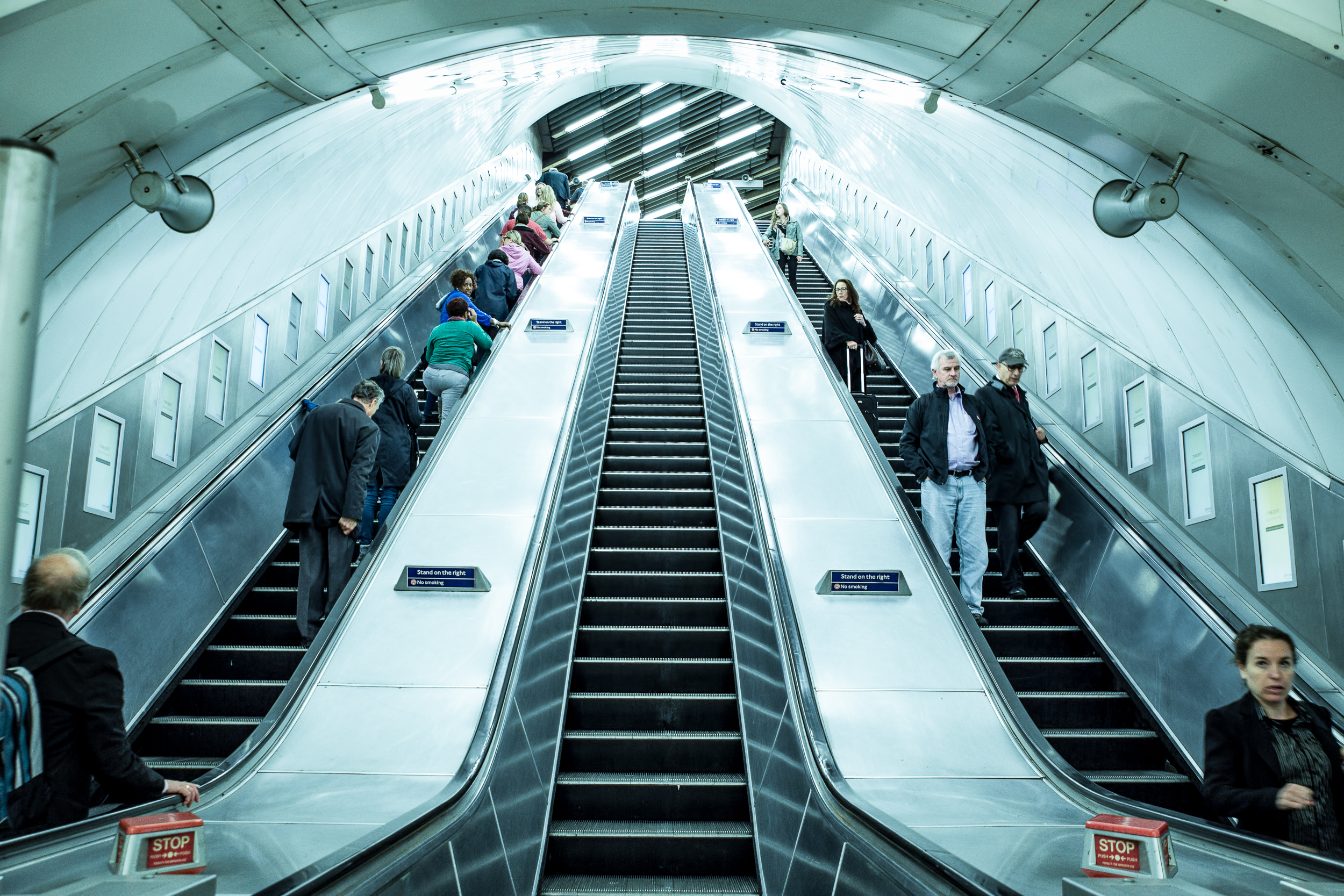
From subway stations and shopping malls to office buildings and airports, escalators are a part of everyday life in New York City. While these moving stairways help millions of New Yorkers get where they’re going a little quicker, they also pose serious safety risks when they’re poorly maintained, improperly inspected, or suddenly malfunction.
Each year, hundreds of people in NYC suffer injuries on escalators due to slips and falls, mechanical failures, and sudden stops or reversals. Children, seniors, and individuals with mobility issues are especially vulnerable, but anyone can become a victim.
If you or a loved one has been injured on an escalator in New York, it’s important to understand your legal rights and the steps you can take to protect them. Here, the experienced NY escalator accident lawyers at HKD will break down the most common causes of escalator accidents, who may be responsible, and what to do after an injury.
Escalator Accidents – More Common & Dangerous Than You Think
Escalators may seem routine, but they pose serious dangers when neglected. A tragic incident in China underscored this risk when a 31-year-old mother, Xiang Liujuan, fell to her death through a faulty metal panel after saving her child. Mall staff had reportedly noticed the issue just minutes earlier but failed to stop the escalator. The tragedy brought several similar incidents to the fore, and throughout China, people began riding escalators like this.
New York City Escalator Accidents: A Rising Concern
Even in New York, our relationship with escalators is complicated—residents admire the historic wooden ones at Macy’s Herald Square, yet many regularly vent frustrations over the frequently broken escalators in transit hubs like Penn Station.
In 1987, a fatal escalator accident in Brooklyn claimed the life of Emma Niskala when a step collapsed beneath her at the New York Telephone Company building. Malfunctions like sudden reversals have also caused injuries—such as a PATH station incident where five people were hurt.
According to the NYC Department of Buildings, incidents involving escalators and elevators have steadily increased—from 50 reported cases in 2021 to 100 in 2023, with most involving slips, falls, or mechanical issues. Meanwhile, the MTA has struggled to keep up with escalator maintenance in the subway system, with some stations reporting functionality rates as low as 20%. These maintenance issues create unsafe conditions for the millions of riders who use escalators daily.
In recent years, escalator injury lawsuits have also drawn attention to the legal responsibilities of property owners and maintenance contractors. For instance, in 2024, several people were injured in a JFK escalator incident. So, whether in a transit hub, shopping center, or office building, failing to maintain escalators can lead to serious injuries.
What Causes New York Escalator Accidents?
Escalator accidents don’t just happen—they’re almost always the result of preventable hazards. In New York City, where aging infrastructure meets high foot traffic, the risk of injury increases when property owners or maintenance contractors fail to uphold proper safety standards.
Poor Maintenance & Mechanical Failure
Many escalators in NYC’s subways, department stores, and high-rise buildings are decades old. Without routine maintenance and timely repairs, these machines become dangerous. Failing parts—like worn-out steps, loose handrails, or malfunctioning gears—can create trip hazards or cause sudden breakdowns. Infrequent inspections or ignoring known maintenance issues may result in liability for building owners or contractors.
Sudden Stops or Abrupt Reversals
When an escalator comes to a jarring halt or reverses direction without warning, it can throw riders off balance and cause serious falls. These types of malfunctions often stem from electrical failures or faulty braking systems. Sudden movement is particularly dangerous in crowded stations or retail environments, where people are standing close together and may not be able to brace themselves in time.
Escalator Entrapment Injuries
Shoes, shoelaces, long clothing, or even body parts can become caught in the gaps between steps, side panels, or the comb plate at the top or bottom of the escalator. These entrapment injuries can be catastrophic, especially for young children. A failure to install or maintain proper safety guards may result in legal liability for those responsible for the escalator’s upkeep.
Escalator Slip & Falls
Escalator surfaces can become hazardous when wet, dirty, or covered with debris. Spills, weather conditions, or neglectful cleaning can all contribute to dangerous footing. Sudden stops or jerky movements can also cause slips. These accidents often affect vulnerable populations—especially children under 5 and older adults—but anyone can lose their footing if conditions are unsafe.
Overcrowding & Unsafe Behavior
During rush hour or busy shopping times, escalators often become overcrowded, increasing the risk of accidents. Riders may push, stand too close together, or ignore safety signage. But even in cases involving user error, property owners have a legal obligation to provide adequate warnings, clear instructions, and properly functioning equipment to prevent injuries.
If you’ve been injured on an escalator in New York due to one of these hazards, you may have grounds for a lawsuit under New York’s premises liability laws. Contact a local NYC personal injury attorney to discuss your options.
What to Do After an Escalator Accident in NYC
If you’ve been hurt on an escalator in New York, the steps you take immediately afterward can significantly affect both your health and your ability to file a successful personal injury claim.
- Get Medical Attention – Even minor injuries should be evaluated promptly to prevent complications and document your condition.
- Report the Incident—Notify the property owner, building manager, or MTA. If possible, request an official incident report.
- Document the Scene – Take photos of the escalator, hazards, and your injuries. Collect witness contact info.
- Don’t Give Recorded Statements – Avoid speaking to insurers or property reps before consulting a lawyer.
- Contact a Lawyer – A qualified attorney can protect your rights and pursue full compensation.
Escalator Safety Tips for New Yorkers
While some escalator accidents are due to mechanical issues or poor maintenance, many incidents can be avoided by taking simple precautions. Whether you’re navigating a crowded subway station or a busy shopping center, these safety tips can help you and your loved ones stay safe on escalators across NYC:
- Hold the Handrail: Escalators can jolt, stop suddenly, or change speed without warning. Holding the handrail provides stability and helps prevent falls, especially in crowded or fast-moving environments.
- Watch Your Step: Be especially cautious when stepping on or off the escalator. Misjudging the first or last step is one of the most common causes of trips and falls. Make sure your footing is secure and avoid stepping over others.
- Avoid Using Strollers, Carts, or Wheeled Items: Never take strollers, rolling luggage, carts, or similar items on an escalator. These objects can tip or get caught in the moving parts, putting you—and others around you—at serious risk. Always use an elevator in these situations.
- Keep Clothing & Personal Items Clear: Loose shoelaces, bag straps, and long clothing (like scarves or coats) can get caught in the sides or base of the escalator. Secure or tuck in any items that might dangle near the edges to avoid dangerous entrapments.
- Stay Alert & Avoid Distractions: Texting, browsing, or wearing noise-canceling headphones while on an escalator reduces your awareness of your surroundings. Stay focused and aware of sudden stops, changes in movement, or crowding ahead of you.
- Supervise Children & Help Older Adults: Young children and elderly individuals are more vulnerable to losing balance or misstepping. Always hold a child’s hand and stand close to them while riding. Aid seniors and consider choosing an elevator if stability is a concern.
Your Legal Rights After an Escalator Injury
Many escalator-related injuries are preventable, and when they result from negligence, victims may be entitled to financial compensation for the resulting damages.
Can I Sue for an Escalator Injury in New York?
If your escalator-related injury was caused by negligence, such as poor maintenance, defective parts, or a failure to warn about hazards, you may have grounds to file a personal injury lawsuit. These cases typically fall under premises liability, which holds property owners and responsible parties accountable for unsafe conditions on their premises.
Who Is Liable for an Escalator Accident?
Legal liability for an escalator accident often depends on where the incident occurred and who was responsible for maintaining the equipment. Potentially liable parties may include:
- Property owners or landlords
- Building managers or security companies
- Escalator maintenance contractors
- Government entities like the MTA, if the accident occurred in a public transit station
An experienced lawyer can help investigate your case, identify the responsible parties, and build a strong legal claim on your behalf.
What Can You Recover After an Escalator Accident?
Depending on the severity of your injuries and how they impact your life, you can pursue damages to cover your medical costs, lost income, pain and suffering, and long-term disability needs.
- Medical bills – ER visits, surgeries, rehab, prescriptions, ongoing care
- Lost wages – Income lost due to time off work or reduced earning capacity
- Pain and suffering – Physical pain, emotional distress, and loss of enjoyment of life
- Long-term disability – Costs related to permanent injuries, home modifications, and future care
For Legal Help After an Escalator Accident – Get HKD
Escalators may be a routine part of daily life in New York City, but the injuries they cause can be anything but.
If you’ve been injured on an escalator, don’t navigate the aftermath alone. Knowing your rights and having the right legal support can make all the difference. At HKD, our experienced NYC escalator accident lawyers are here to help you understand your options and fight for the compensation you deserve.
Contact Hecht, Kleeger & Damashek, P.C. today. Initial consultations are free, and we work on a contingency basis—meaning there’s no fee unless we win.

